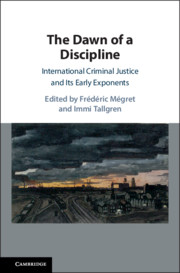Book contents
- Reviews
- The Dawn of a Discipline
- The Dawn of a Discipline
- Copyright page
- Contents
- Contributors
- Foreword
- 1 Introduction
- 2 Hugh H. L. Bellot
- 3 Vespasian V. Pella
- 4 Emil Stanisław Rappaport
- 5 International Criminal Justice as Universal Social Defence
- 6 Henri Donnedieu de Vabres
- 7 Not Just Pure Theory
- 8 Principled Pragmatist?
- 9 Retelling Radha Binod Pal
- 10 Aron Trainin
- 11 The Complex Life of Rafal Lemkin
- 12 Stefan Glaser
- 13 Yokota Kisaburō
- 14 Jean Graven
- 15 Absent or Invisible?
- Index
13 - Yokota Kisaburō
Defending International Criminal Justice in Interwar and Early Post-War Japan
Published online by Cambridge University Press: 04 September 2020
- Reviews
- The Dawn of a Discipline
- The Dawn of a Discipline
- Copyright page
- Contents
- Contributors
- Foreword
- 1 Introduction
- 2 Hugh H. L. Bellot
- 3 Vespasian V. Pella
- 4 Emil Stanisław Rappaport
- 5 International Criminal Justice as Universal Social Defence
- 6 Henri Donnedieu de Vabres
- 7 Not Just Pure Theory
- 8 Principled Pragmatist?
- 9 Retelling Radha Binod Pal
- 10 Aron Trainin
- 11 The Complex Life of Rafal Lemkin
- 12 Stefan Glaser
- 13 Yokota Kisaburō
- 14 Jean Graven
- 15 Absent or Invisible?
- Index
Summary
Notwithstanding the obvious lacunas and lack of documents concerning Trainin’s controversial biography, the author makes an attempt to take a fresh and independent look at Trainin’s personality and scholarship. Kisaburō Yokota (1896–1993) was one of the most influential, albeit not uncontentious, international lawyers in interwar and postwar Japan, and an eminent early champion of international criminal justice, when this was still highly unpopular in Japan. His internationalist vision inspired by Kelsen and his critique of Japan’s aggressive expansion politics in the 1930s put him in the minority. After Japan’s defeat, this earlier position stood him in good stead and he advanced to being the most influential lawyer and public intellectual in postwar Japan, advising the Supreme Commander for the Allied Powers (SCAP) as well as the Japanese government in matters of international law and criminal justice. Thus, he was a strong advocate for the Tokyo Trial of 1946–1948, published widely in support of it and also helped SCAP translate the final verdict into Japanese. The onset of the Cold War soon led to a more realistic repositioning of Yokota, but in his advocacy of international criminal justice, he remained steadfast. A study of Yokota’s writings and discussions serve to understand the historical position of Japanese lawyers and intellectuals towards the Tokyo Trial and international criminal justice even today.
- Type
- Chapter
- Information
- The Dawn of a DisciplineInternational Criminal Justice and Its Early Exponents, pp. 335 - 357Publisher: Cambridge University PressPrint publication year: 2020

